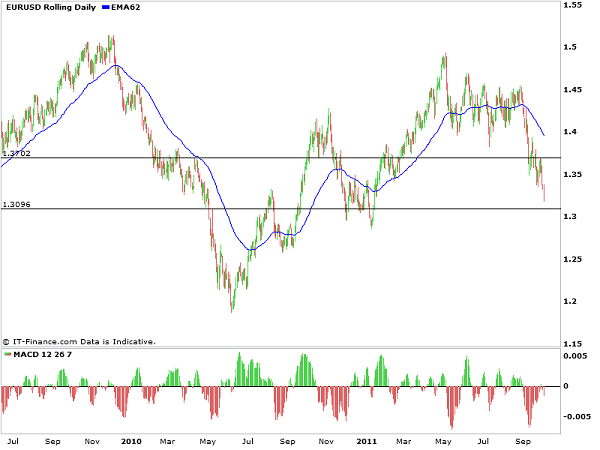This morning all eyes were focused firmly on the number 50. Banks, traders and politicians held their breath as the most powerful economy in Europe stood before an economic indicator with the authority to well and truly nail the lid on the Europe’s financial coffin. Greece, Portugal, and Spain have already been digging tirelessly in the graveyard of economic depression whilst Germany, the only doctor in the region, is both running out of remedies and showing dangerous signs of fatigue. Other European economies have shown signs of infection in recent weeks with a plummeting Euro and share prices hitting two-year record declines. To those hankering on the edge, the global focus on Germanys PMI was literally a case of economic life and death.
The reasons that the PMI and, in particular, the number 50 were of such global importance today is that it represents the manufacturing output of Germany as the largest exporter, and thus the economic powerhouse of Europe. The number 50 is a critical PMI value in that anything below this figure constitutes a contraction in output whilst that above represents expansion. The fact that Germany scraped through today at 50.3, technically still expanding, will not have instilled any confidence whatsoever in the view that Europe will experience zero growth this year and potentially even a region-wide contraction. Confidence in the political noises being made to resurrect the regions troubled finances are being reflected in the value of the euro. It´s violent decline represents both a vote of no-confidence and an overwhelmingly pessimistic perception of Europe´s chances of preventing both a double-dip recession and a Greek default which is now something of a certainty than simply a possibility.

With the compounding of negative news in such an acute space of time the value of the euro has been compressed with barely any time to perform even the most modest of corrections. It is well and truly in a downtrend and the 1300 mark is looking particularly imminent from a technical perspective. Looking at the chart of the EUR/USD, it would take a monumental reversal of sentiment to break the back of this strong move which could only occur if the Euro were to close above the 1.3700 level. It is incredibly tempting, however, for the contrarian traders amongst us to see this as an opportunity to catch a dead-cat bounce as profit-takers and the minorities of eternal bulls see an opportunity for high-probability pips.
The old adage, never catch a falling knife, exists for a reason. Sometimes you get lucky but more often you don´t unless you have a particularly good technique. Looking at the EUR/USD chart at first glance it looks overstretched and due a correction. However, it is important to note that fundamentals rather than technicals are driving this market. Some brave traders may look for a pullback around the next significant support level of 1.3100, perhaps trading with some significant price action such as a clear candlestick signal such as a hammer or bullish outside bar and for a short period. With this in mind, it would certainly be worth remembering that today’s announcement of near-German economic contraction is not something that is going to be forgotten.
Comments (No)